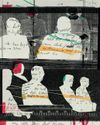
“I Write to Please my Self,” Margaret Cavendish, Duchess of New
castle, declared in her “Orations of Divers Sorts” (1662). A shy, solitary woman with a passion for poetry and scientific inquiry—what did she see when she peered inside “Natures Cabinet, the Braine”? She saw “Fans of Opinion,” “Gloves of Remembrance, Veiles of Forgetfulnesse,” “Pendants of Understanding” to adorn the ears of the wisest women. She saw “Black Patches of Ignorance, to stick on/The Face of Fooles.” Brightest of all were the “Ribbons of Fancies.” By “fancy,” she meant the wild, inventive faculty of the mind which allowed her to see forgetfulness as a veil or
the brain as a cabinet in the first place. From her cabinet tumbled some of
the strangest prose and verse of the seventeenth century, beginning, in 1653, with her “Poems, and Fancies”:
When Nature first this World she did create, She cal’d a Counsell how the same might make; Motion was first, who had a subtle wit, And then came Life, and Forme, and Mat
ter fit.
Do not be fooled by these sweet couplets. They were the prelude to an enormously ambitious philosophy of nature’s diffuse, uneasy vitality. Across almost three hundred poems, Cavendish speculated about how atoms joined
This story is from the {{IssueName}} edition of {{MagazineName}}.
Start your 7-day Magzter GOLD free trial to access thousands of curated premium stories, and 9,000+ magazines and newspapers.
Already a subscriber ? Sign In
This story is from the {{IssueName}} edition of {{MagazineName}}.
Start your 7-day Magzter GOLD free trial to access thousands of curated premium stories, and 9,000+ magazines and newspapers.
Already a subscriber? Sign In

GET IT TOGETHER
In the beginning was the mob, and the mob was bad. In Gibbon’s 1776 “Decline and Fall of the Roman Empire,” the Roman mob makes regular appearances, usually at the instigation of a demagogue, loudly demanding to be placated with free food and entertainment (“bread and circuses”), and, though they don’t get to rule, they sometimes get to choose who will.

GAINING CONTROL
The frenemies who fought to bring contraception to this country.

REBELS WITH A CAUSE
In the new FX/Hulu series “Say Nothing,” life as an armed revolutionary during the Troubles has—at least at first—an air of glamour.

AGAINST THE CURRENT
\"Give Me Carmelita Tropicana!,\" at Soho Rep, and \"Gatz,\" at the Public.

METAMORPHOSIS
The director Marielle Heller explores the feral side of child rearing.

THE BIG SPIN
A district attorney's office investigates how its prosecutors picked death-penalty juries.

THIS ELECTION JUST PROVES WHAT I ALREADY BELIEVED
I hate to say I told you so, but here we are. Kamala Harris’s loss will go down in history as a catastrophe that could have easily been avoided if more people had thought whatever I happen to think.

HOLD YOUR TONGUE
Can the world's most populous country protect its languages?

A LONG WAY HOME
Ordinarily, I hate staying at someone's house, but when Hugh and I visited his friend Mary in Maine we had no other choice.

YULE RULES
“Christmas Eve in Miller’s Point.”